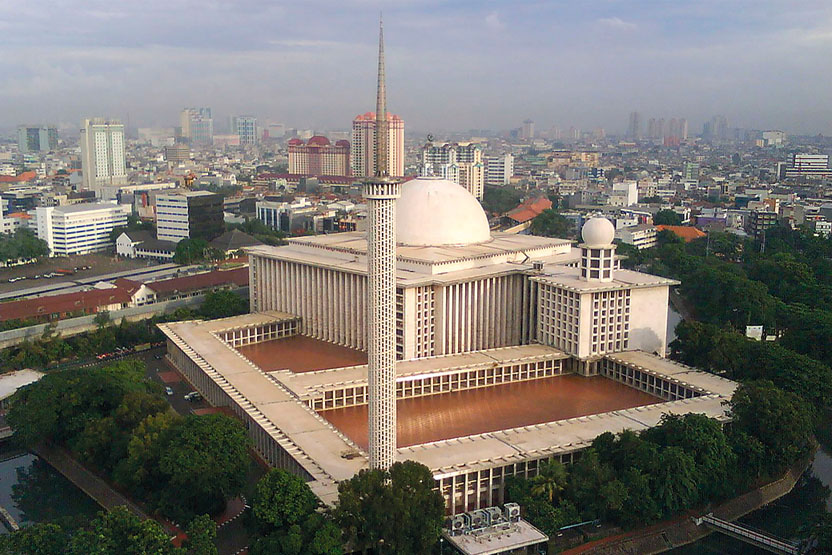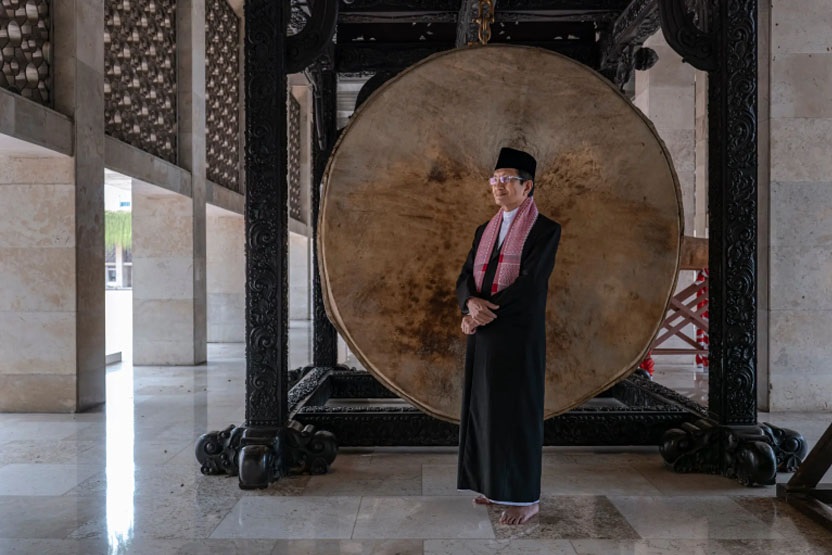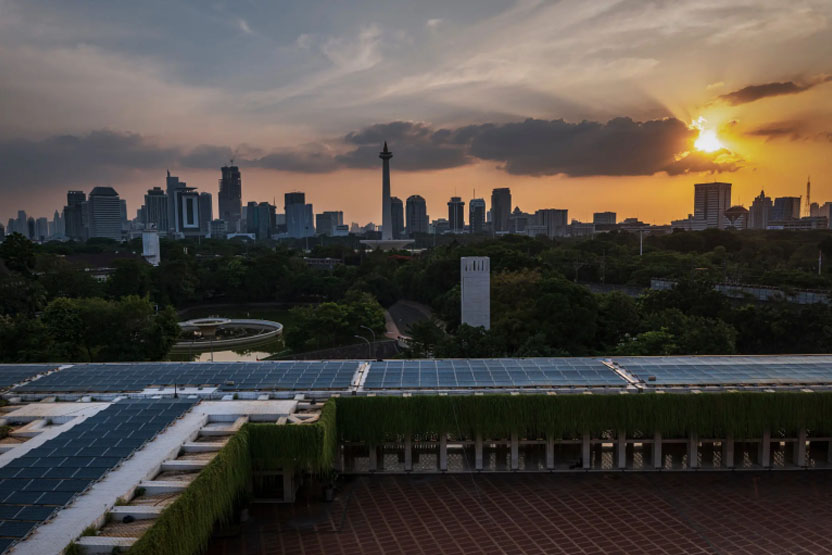
Jakarta's Istiqlal Mosque becomes the world's first mosque to receive a green building certification from the World Bank's International Finance Corporation.
With a population of 228 million in 2023, Indonesia ranks among the world's most polluted countries and is one of the most vulnerable to natural disasters. As environmental problems worsen and their impacts intensify, a new movement known as “Green Islam” has emerged across the archipelago, taking a leading role in climate and environmental action.
At its core, this movement draws on Islamic teachings—embraced by 87% of Indonesians—as a foundation for addressing environmental issues and raising public awareness. In this context, devout Muslims are assuming a central role in reshaping mindsets to combat climate change in Indonesia, one of the world's top emitters of greenhouse gases.
With more than 17,000 islands, Indonesia faces a genuine environmental and climate crisis. Alongside the waste management challenge, the country grapples with two major climate-related problems: coal-powered energy production and deforestation.
Indonesia is the world’s largest exporter of thermal coal and also the top producer of palm oil. Both industries contribute heavily to carbon dioxide emissions due to large-scale deforestation for palm oil plantations and mineral extraction. Forest fires and flooding, exacerbated by extreme weather linked to rising temperatures, have become increasingly severe.
The country also holds vast reserves of nickel, a metal essential to electric vehicle batteries, but its processing requires the burning of fossil fuels. President-elect Prabowo Subianto has launched a campaign to expand biofuel production—an initiative that, while promising on the surface, could implicitly lead to more deforestation and environmental degradation.
This economic model threatens local populations. Emissions from power plants and deforestation significantly impact the health and livelihoods of rural residents. Many of Indonesia’s remote and impoverished provinces regularly face drought, exacerbating poverty and social vulnerability.
The imam of Jakarta's Istiqlal Mosque offers solutions to environmental problems and pollution through Islamic teachings.
The environment is a religious and worldly concern
In Jakarta’s Merdeka Square, the majestic Istiqlal Mosque is not only one of the largest in Southeast Asia in terms of architecture and capacity—it can accommodate up to 200,000 worshippers—but it has also become a pioneering symbol of the “Green Islam” movement and a platform for environmental and climate education.
Demonstrating the possibilities of eco-conscious faith institutions, the mosque has installed 500 solar panels, reducing its electricity bill by 25%. Thanks to slow-flow water taps and a water recycling system, worshippers now use significantly less water for ablutions before prayer.
With these sustainable practices in place, Istiqlal became the first mosque in the world to receive a green building certification from the World Bank’s International Finance Corporation (IFC). Grand Imam Nasaruddin Umar, a leading figure of the Green Islam movement, has announced an ambitious goal: to convert 70% of Indonesia’s approximately 800,000 mosques into environmentally friendly mosques.
In one of his Friday sermons, Imam Umar—who also served as Indonesia’s Minister of Religious Affairs—warned: “One of our fatal human flaws is that we treat the Earth as something ordinary. The more greed we show toward nature, the closer the Day of Judgment becomes.”
He advocates solutions rooted in Islamic principles: “Just as fasting during Ramadan is a religious duty, every Muslim has a responsibility to protect the Earth. Just as almsgiving (zakat) is an obligation, investing in renewable energy is a form of spiritual charity. And like our daily prayers, planting trees should become a habit.”
Environmental issues have become central themes in the imam's sermons. Disturbed by the pollution of the river near the mosque, he ordered it cleaned. Shocked by the high utility bills, he equipped the mosque with solar panels, low-flow taps, and a water recycling system—all in accordance with the Islamic mandate to care for and preserve nature.
“As a country with the largest Muslim population in the world, we must set a positive example for the global Muslim community,” he said.
A Growing Movement Backed by Islamic Institutions
The Green Islam movement enjoys strong support from Nahdlatul Ulama and Muhammadiyah, the two largest Muslim mass organizations in the country. Both groups finance schools, hospitals, and social services. Nahdlatul Ulama has even recruited prominent environmental activist Ak Abdullah Quddus to lead its “Spiritual Ecology” program, which uses Islamic teachings to promote environmental stewardship.
In March 2024, Indonesia’s Council of Ulama—the country’s highest Islamic authority—issued a fatwa declaring all actions that damage the environment or contribute to the climate crisis, including deforestation and excessive emissions, to be forbidden (haram) under Islamic law.
Religious-Political Synergy for Climate Action
On the political front, Green Islam is becoming a powerful force. The administration of former President Joko Widodo pledged to work closely with religious scholars, Muslim communities, and Islamic organizations to meet its goal of achieving net-zero emissions by 2060.
The Ministry of Environment and Forestry signed a partnership agreement with Nahdlatul Ulama, the country’s largest Islamic organization, to improve environmental management and promote sustainable forest governance.
In line with the growing role of the “Green Islam” movement, the country’s senior religious scholars have issued fatwas on how to mitigate climate change and preserve the environment. Environmental activists call on their friends, families, neighbors, and schools to protect nature, emphasizing that it is a core principle of Islam and part of the teachings of the Holy Qur’an.
Supporters of the “Green Islam” movement argue that educating 200 million Muslims about the religious roots of environmental stewardship could lead to meaningful ecological and climate transformation.
In this context, Prabowo, head of the Environmental Protection Division at the Indonesian Ulema Council—the country’s highest Islamic authority—told The New York Times:
“People don’t listen to laws—they don’t care about them. But they listen to religious leaders, because those leaders tell them you can escape human laws, but you cannot escape the laws of God.”
Prabowo noted that while the council’s fatwas are not legally binding, they have had a noticeable impact. Studies have shown that communities living in forest-rich and peatland areas have become more aware of the harm in clearing such lands due to fatwas explicitly prohibiting these activities.
Solar panels installed next to Jakarta’s Istiqlal Mosque
A Moral and Spiritual Mission
In East Java, environmental activist Abdullah Qudus states:
“Our mission is to be stewards of the Earth—its protectors. This is Islam’s message.”
Qudus sought to combine a tree-planting campaign with celebrations of the Prophet Muhammad’s birthday. Though initially met with resistance, his initiative gained momentum over time. He eventually founded an environmental group called the “Green Army.”
This army, composed of volunteers, organizes reforestation efforts on Mount Lemongan, a small volcano where 2,000 hectares of protected forest had been cut down. Thanks to their efforts, the area is now once again covered with bamboo and fruit trees.
In a city in Central Java, Elok Faiqotul Mutiya grew up watching teak forests being logged to supply her family’s furniture business. One of her first jobs was as a researcher at Greenpeace. She later founded the organization Inter Nusantara, aimed at educating young people about climate change.
“I wanted to atone for my father’s sins against the Earth,” she explains.
Mutiya believes Islam can offer Indonesians a more compassionate message on environmental preservation. She cited a survey showing that Indonesian Muslims are more likely to listen to religious leaders than to government officials, the media, or even the president.
The widespread influence of various Islamic organizations has played a significant role in raising environmental awareness in Indonesia and advancing more responsible environmental and energy policies. Inspired by the growing reach of the “Green Islam” movement, Indonesia’s Ministry of Education and Culture is also working to make environmental issues a core component of early education, integrating sustainability and environmental stewardship into school curricula.
As the world’s most populous Muslim-majority country, Indonesia demonstrates how religion can be a powerful driver in the movement to protect the planet from the climate crisis. Today, the “Green Islam” movement is beginning to take on a global dimension.




Comment
Reply